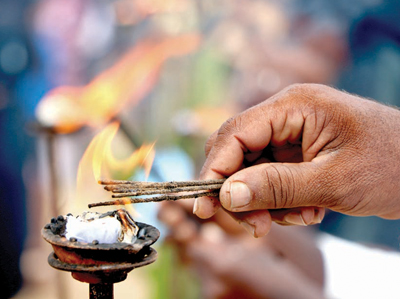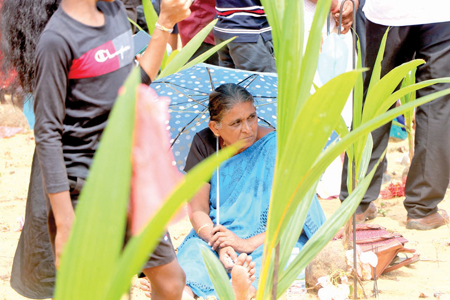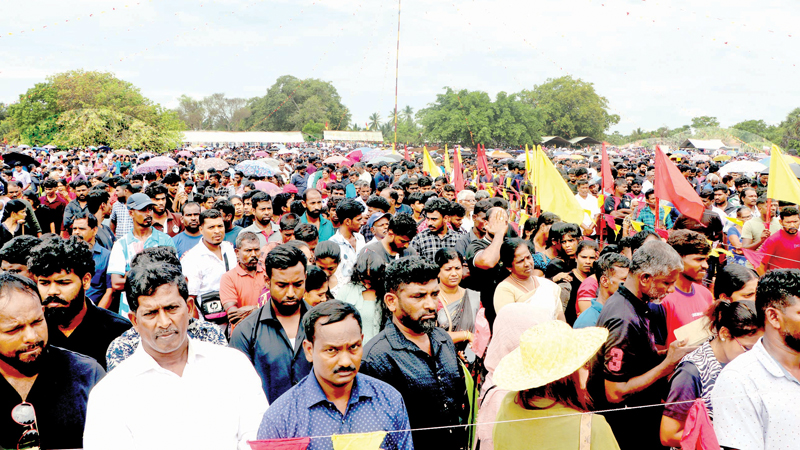 On May 18, around 9 a.m., scores of people were seen making their way across the narrow road spanning the Nandikadal Lagoon, heading towards Mullivaikkal, a place etched with haunting and tragic memories of the past. While the exact death toll remains disputed, a United Nations report in 2011 estimated that around 40,000 civilians were killed in the final phase of Sri Lanka’s long drawn conflict at this very location.
On May 18, around 9 a.m., scores of people were seen making their way across the narrow road spanning the Nandikadal Lagoon, heading towards Mullivaikkal, a place etched with haunting and tragic memories of the past. While the exact death toll remains disputed, a United Nations report in 2011 estimated that around 40,000 civilians were killed in the final phase of Sri Lanka’s long drawn conflict at this very location.
However the Government has maintained that the death toll at the time was around 9,000. Regardless of the number, the loss is immeasurable. Each life ended was someone’s parent, child, sibling, or friend, lives cut short in the chaos of war. Mullivaikkal stands today not just as a symbol of that loss, but as a solemn reminder of the human cost of conflict.
“Walk slowly. Let your footsteps be silent. For it is on this quiet land that one of the world’s greatest human tragedies was enacted and endured.”
At precisely 10.30 a.m. the crowd gathered and fell silent. The stillness was heavy, as if the land itself remembered. At that moment, it no longer felt like we were standing on solid ground, we were in a graveyard. A single lamp was lit. With each lamp, a coconut was placed beside it, a symbolic offering to loved ones who never returned. The Mullivaikkal proclamation soon echoed through the loudspeakers. Grief hung heavy in the air. Tears flowed freely. Mothers clutched fading photographs. Fathers stood frozen in silence. The air trembled with the sound of weeping.
Among the emotional crowd gathered was Nageswari. She had travelled from Kilinochchi to attend the remembrance event. According to Nageshwari, her son, 18 years old at the time, had been injured during the final days of the war. She recalls that the Army had offered to take him for treatment. “I’ve searched everywhere,” she said. “To this day, no one knows what happened to him after that.”
Sixteen years
It has been sixteen years since the guns fell silent in Sri Lanka’s decades-long armed conflict. Yet the wounds of the past remain fresh not only in the North, where the war’s final battles unfolded, but also in the South, where memories of loss, fear, and displacement still linger. The psychological and political legacies of the conflict continue to shape how communities remember, vote, and demand justice. However, against this backdrop, a major political shift has recently emerged in the North.
 President Anura Kumara Dissanayake, leader of the National People’s Power (NPP), was recently elected as Sri Lanka’s fifth President since the ending of the war in 2009. His rise marks a historic moment, not only for the South but significantly for the North, where Tamil-majority districts, long dominated by ethnic nationalist parties, showed unexpected support for the leftist NPP at the recent general elections.
President Anura Kumara Dissanayake, leader of the National People’s Power (NPP), was recently elected as Sri Lanka’s fifth President since the ending of the war in 2009. His rise marks a historic moment, not only for the South but significantly for the North, where Tamil-majority districts, long dominated by ethnic nationalist parties, showed unexpected support for the leftist NPP at the recent general elections.
At the most recent parliamentary polls, the NPP achieved unprecedented success in the Northern Province. In the Jaffna electoral district, traditionally a stronghold of Tamil nationalist parties, the NPP won three seats, securing 80,830 votes and 24.85 percent of the total vote share. The party performed strongly across nearly all polling divisions, winning in all electorates except Kayts, Kilinochchi, and Chavakachcheri.
The shift was even more striking in the Vanni district, a region deeply affected by the final stages of the war. There, the NPP secured two parliamentary seats, receiving 39,894 votes, which translated to 20.37 percent of the vote, a first in the party’s history.
These results took many political analysts by surprise. For decades, electoral politics in the North had been dominated by parties championing Tamil nationalism and calls for Federalism. But this time, the tide had shifted, signalling a significant change in political sentiment and priorities among the Northern electorate.
The question
This year’s Mullivaikkal commemoration carried more than remembrance—it carried a quiet but important question, now spoken openly in Mullaitivu. For the first time since the conflict ended in 2009, the National People’s Power (NPP), which won a historic mandate in the North, was in Government during this solemn occasion.
Six months into the new administration, amid ongoing grief and healing, a simple question was asked of those gathered from across the Northern Province:
“After six months in office, do you feel the new Government is addressing your concerns and working towards a lasting solution?”
According to human rights activist Ruki Fernando, who was also present at the event, certain Government statements and actions have at times offered hope to the people of the North. However, progress has often been uneven, with occasional setbacks. For example, Fernando said that many had hoped the Government would send a representative to participate in the commemoration, but unfortunately, that did not happen. He said that while the new Government did not hinder this year’s commemoration events, many feel that silence alone is not enough, and more meaningful action is needed.
Expressing his views, author and poet Theepachelvan said the Tamils had voted for the NPP Government with great hope. While commending the Government for allowing the commemoration events in the North to proceed without obstruction, he expressed that the presence of the military was unsettling.
He also expressed hope that the South had elected educated and capable representatives to Parliament, rather than more divisive figures associated with Sinhala nationalism, such as Wimal Weerawansa, Udaya Gammanpila, and Rear Admiral Sarath Weerasekara. “If the Government works sincerely, there’s still a chance for people from all communities to live together with equal rights,” he said.
Meanwhile, Lipsiya, a young filmmaker, observed that although the war ended 16 years ago, many of the Tamil community’s struggles remain unresolved. Families are still searching for answers about their missing loved ones, and not all land taken during the conflict has been returned. “These promises often resurface around election time,” she said adding, “but little tends to follow.” Expressing a sense of hesitation and uncertainty, she added, “As a young woman, I wonder if we will ever see real change.”
Political activist, Elankovan Chandrahasan told the Sunday Observer that Tamil-speaking people in Sri Lanka have long held onto the hope of being treated as equals—of having their political rights respected and a meaningful role in shaping the governance of the country.
“This is a long-standing dream,” he said. “When the new Government came to power, Tamil-speaking communities across the country voted for them with that same hope.”

Pics by Shabeer Mohamed
According to him, while many feel that significant change has yet to materialise, they continue to hold on to hope that it still can.
“Some say that the support for the National People’s Power (NPP) had dropped at the Local Government elections. But in areas where Tamil-speaking people live, NPP actually received a good number of votes. This shows that people still believe in them,” he said.
He said that the Government should take concrete steps to release occupied land, ensure the proper and consistent use of the Tamil language in official settings, and make a clear effort to include Tamil-speaking Muslims and hill country Tamils in meaningful and inclusive ways.
The decline of traditional Tamil nationalist parties and the rise of the National People’s Power (NPP) reflect a shift in thinking among the younger generation. Their aspirations are shaped less by identity politics and more by social and economic concerns. The NPP’s message resonates with these evolving priorities, offering a sense of unity and belonging as if everyone, regardless of ethnicity, is part of the same nation. That inclusivity is their strength.
Tamil politics, meanwhile, is still grappling with the weight of past losses. But there is potential for a new kind of national politics, one that genuinely includes all communities. The NPP’s growing appeal lies in its fresh approach, and the younger generation is beginning to respond to that possibility. This, perhaps, is where change can begin.
Sixteen years after the end of the war, the wounds of Mullivaikkal remain etched not only in memory but in daily life. Yet amid the pain and political disillusionment, a new generation is emerging—questioning, engaging, and pushing for change. Some hold cautious hope in new leadership, while others remain wary of being let down again. But they are united by one truth: the struggle is not only about honouring the past, but securing a future in which justice, identity, and memory are preserved, and not erased.
Mullivaikkal is more than a place. It is a question that persists: How long must a people wait to be seen and treated as equals in the land they call home?




